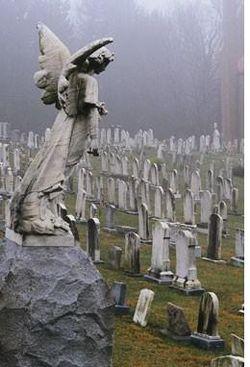Arguably one of the most criticized yet most misunderstood of Catholic doctrines is purgatory. John Goerke takes on the task of explaining why it's a gift to us all:
“We know John is in heaven,” remarked the minister as the funeral began. Several dozen impromptu eulogies followed, all of which offered the same sentiment. A song crackled from an unseen CD player: “If you could see me noooowwwww… I’m walking streets of gold. If you could see me now, I’m standing tall and whole.” The lack of sorrow before the funeral was now explained: everyone was absolutely certain John was in heaven. There were no tears because there was no cause for crying. John was with God and we are glad.
But for all the happiness and smiles; there was something deeply troubling about the scene. On the one hand, a gathering of persons after a death ought to be sad. On the other, it is difficult to justify
tears for a soul gone to heaven, and pointless to shed tears for a soul gone the other way. Both heaven and hell are permanent, whereas even the deepest grief is transient, and with time it will pass. A permanent grief would be no grief at all. Grief is sorrow over deviations from the norm, not the norm itself. The world falls for a moment out of order and we grieve. Our joy comes with the morning and the dawn of a new heaven and a new earth: a world set right. But here, even a moment of transient grief was not to be had.
The ceremony lumbered on, past the point where my legs could remain awake. Our Lord taught that in prayer: “We must not prattle on as the Protestants—er—pagans do.” As words followed words followed words; I realized the reason for grief’s absence among the crowd. The Billy Graham apostles who populated this room had no concept of purgatory, the great gift of Our Lord to us.
I am not here going to spend much time arguing for the existence of purgatory. We read in the Gospel of Mark that those who blaspheme the Holy Spirit shall not be forgiven in this life or the next. Given that no one in heaven needs forgiveness anymore, and that no one in hell will accept it, forgiveness of sins in the world to come must mean another option between heaven and hell: a way station, if you will, for those souls who need further purification. My humble thesis is that purgatory is a great gift to us. Not only is it a blessing for those who pass away, for they may with time and suffering enter the kingdom of heaven, but it is also a gift for we who remain. Purgatory lets us grieve without despair and praise God’s mercy without presumption.
If heaven and hell are the only possible destinations for the deceased, those who grieve are forced to presume that the deceased is in heaven, for the alternative is unacceptable. Yet, absolute certainty of the attainment of heaven is as unjust to a soul as absolute certainty of the damnation of hell. We must not fall into the error of Fred Phelps. We must not replace the judgments of God with the judgments of man, for we are often mistaken. We have neither the power nor the wisdom to know one way or the other.
Purgatory is indeed a gift and so is Goerke's piece. Read it all and understand why both are true.
Carry on.
 tears for a soul gone to heaven, and pointless to shed tears for a soul gone the other way. Both heaven and hell are permanent, whereas even the deepest grief is transient, and with time it will pass. A permanent grief would be no grief at all. Grief is sorrow over deviations from the norm, not the norm itself. The world falls for a moment out of order and we grieve. Our joy comes with the morning and the dawn of a new heaven and a new earth: a world set right. But here, even a moment of transient grief was not to be had.
tears for a soul gone to heaven, and pointless to shed tears for a soul gone the other way. Both heaven and hell are permanent, whereas even the deepest grief is transient, and with time it will pass. A permanent grief would be no grief at all. Grief is sorrow over deviations from the norm, not the norm itself. The world falls for a moment out of order and we grieve. Our joy comes with the morning and the dawn of a new heaven and a new earth: a world set right. But here, even a moment of transient grief was not to be had.